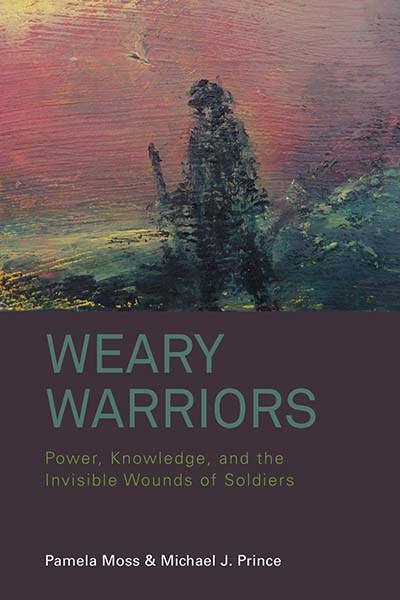“...is the first survey of modern war trauma orientated around this distinctive biopolitical positioning. … It is an exhaustive mining of Foucault’s oeuvre, along with poststructuralist feminist theory and science studies, for theoretical articulations that speak directly to questions of military embodiment and psychiatric knowledge production.” • Kenneth MacLeish, Vanderbilt University in Journal of the Royal Anthropological Institute
“Weary Warriors (the tragedies of its subject-matter aside) is a deeply satisfying book to read…[It] provides an excellent example of an account of war which manages to weave the specificities of time and place of singular conflicts within a broader narrative accounting for the power and politics of a much wider and enduring set of practices around the treatment of those who carry with them the invisible marks of experience of conflict. This history of the militarised constitution of the idea of mental damage is pluralist in its sources, and the authors are unafraid of using a diversity of sources to make their case.” · Cultural Geographies
“This is a solid piece of scholarship. The authors successfully apply key concepts from Foucault, along with those of his feminist critics, to the analysis of soldiers returning from war. In so doing, they deepen our understanding of how weary warriors are constructed through time and space, and what his/her diagnosis, treatment, and release says about wider relations of power in, between, and across the state, the military, psychiatry, and the body itself.” · Carolyn Gallaher, American University
“The authors provide a fascinating and well documented argument, drawing on a sophisticated analysis of theory and research on embodiment, the regulation of subjectivity, and the construction of psychiatric illness. They bring the experience of military distress to life through quotations, and through analysis of memoir and personal resistance. They also provide an important historical perspective to the construction and experience of distress following military engagement.” · Jane M Ussher, University of Western Sydney
As seen in military documents, medical journals, novels, films, television shows, and memoirs, soldiers’ invisible wounds are not innate cracks in individual psyches that break under the stress of war. Instead, the generation of weary warriors is caught up in wider social and political networks and institutions—families, activist groups, government bureaucracies, welfare state programs—mediated through a military hierarchy, psychiatry rooted in mind-body sciences, and various cultural constructs of masculinity. This book offers a history of military psychiatry from the American Civil War to the latest Afghanistan conflict. The authors trace the effects of power and knowledge in relation to the emotional and psychological trauma that shapes soldiers’ bodies, minds, and souls, developing an extensive account of the emergence, diagnosis, and treatment of soldiers’ invisible wounds.
Pamela Moss is a Professor in Human and Social Development at the University of Victoria, British Columbia, Canada. She co-authored with Isabel Dyck of Women, Body, Illness (Rowman and Littlefield, 2003), edited with Katherine Teghtsoonian Contesting Illness (University of Toronto Press, 2008), and wrote and edited with Karen Falconer Al-Hindi Feminisms in Geography (Rowman and Littlefield, 2008). She is working on a book manuscript about women’s tired bodies entitled Fatigue.
Michael J. Prince is Lansdowne Professor of Social Policy at the University of Victoria, British Columbia, Canada. He is author of Absent Citizens: Disability Politics and Policy in Canada (University of Toronto Press, 2009), author and co-editor with Glen Toner and Leslie Pal of Policy: From Ideas to Implementation (McGill-Queen’s University Press, 2010), co-author with Bruce Doern of Three Bio-Realms (University of Toronto Press, 2012), and co-author with James Rice of Changing Politics of Canadian Social Policy, 2nd edition (University of Toronto Press, 2013).
LC: UH629 .M68 2014
BL: YC.2014.a.10785
BISAC: SOC026000 SOCIAL SCIENCE/Sociology/General; HIS027000 HISTORY/Military/General; PSY022040 PSYCHOLOGY/Psychopathology/Post-Traumatic Stress Disorder (PTSD)
BIC: JHB Sociology; HBW Military history
available open access under a Creative Commons Attribution-NonCommercial-NoDerivatives 4.0 International License (CC BY-NC-ND 4.0) with support from Knowledge Unlatched.


